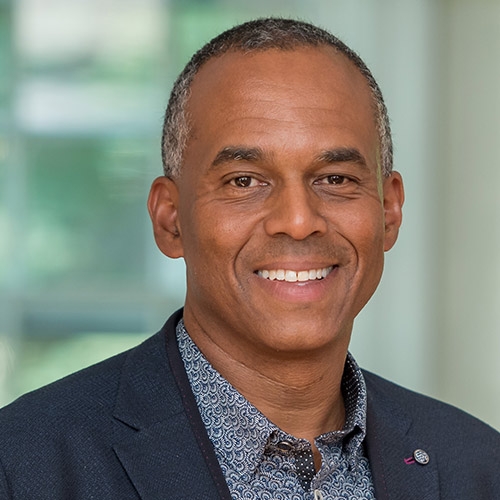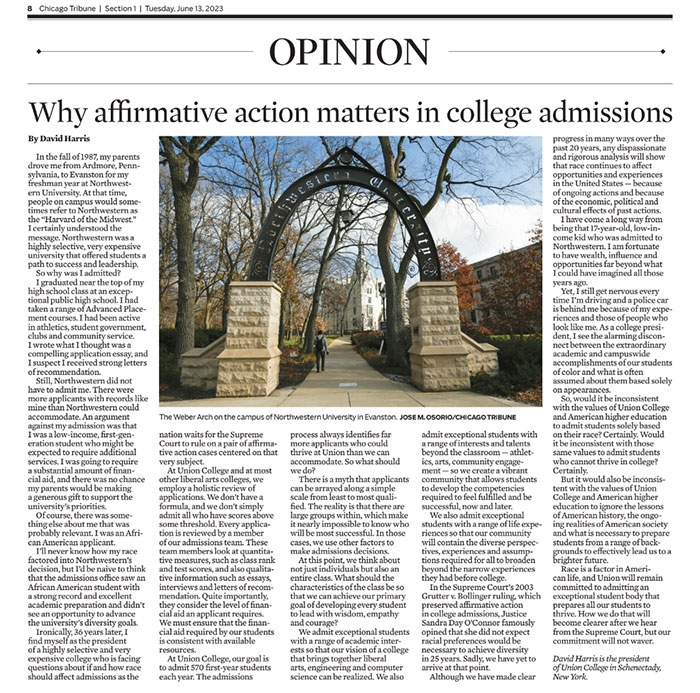The U.S. Supreme Court is expected to rule soon on whether colleges and universities can use race as a factor in admissions decisions. The following is an op-ed by President David R. Harris that was originally published in the Chicago Tribune.
In the fall of 1987, my parents drove me from Ardmore, Pennsylvania, to Evanston for my freshman year at Northwestern University. At that time, people on campus would sometimes refer to Northwestern as the “Harvard of the Midwest.” I certainly understood the message. Northwestern was a highly selective, very expensive university that offered students a path to success and leadership.
So why was I admitted?
I graduated near the top of my high school class at an exceptional public high school. I had taken a range of Advanced Placement (AP) courses. I had been active in athletics, student government, clubs, and community service. I wrote what I thought was a compelling application essay, and I suspect I received strong letters of recommendation.
Still, Northwestern University did not have to admit me. There were more applicants with records like mine than Northwestern could accommodate. Arguing against my admission was that I was a low-income, first-generation student who might be expected to require additional services. I was going to require a substantial amount of financial aid, and there was no chance my parents would be making a generous gift to support the university’s priorities.
Of course, there was something else about me that was probably relevant. I was an African American applicant.
I’ll never know how my race factored into Northwestern’s decision, but I’d be naïve to think that the Admissions Office saw an African American student with a strong record and excellent academic preparation and didn’t see an opportunity to advance the university’s diversity goals.
Ironically, 36 years later I find myself as the president of a highly selective and very expensive college, who is facing questions about if and how race should affect admissions, as the nation waits for the Supreme Court to rule on a pair of affirmative action cases centered on that very subject.
At Union College, and at most other liberal arts colleges, we employ holistic review of applications. We don’t have a formula and we don’t simply admit all who have scores above some threshold.
Every application is reviewed by a member of our Admissions team. They look at quantitative measures, such as class rank and test scores, but also qualitative information such as essays, interviews, and letters of recommendation. Quite importantly, they consider the level of financial aid an applicant requires. As one of fewer than 100 colleges and universities that meet full demonstrated financial need, we must ensure that the financial aid required by our students is consistent with available resources.
At Union College, our goal is to admit 570 first-year students each year. The admissions process always identifies far more applicants who could thrive at Union than we can accommodate. So what should we do?
There is a myth that applicants can be arrayed along a unidimensional scale from least to most qualified. The reality is that there are large groups within which it is nearly impossible to know who will be most successful. In those cases, we use other factors to make admissions decisions.
At this point, we think about not just individuals, but also an entire class. What should the characteristics of the class be so that we can achieve our primary goal of developing every student to lead with wisdom, empathy, and courage?
We admit exceptional students with a range of academic interests so that our vision of a college that brings together liberal arts, engineering, and computer science can be realized. We also admit exceptional students with a range of interests and talents beyond the classroom – athletics, arts, community engagement - so we create a vibrant community that allows students to develop the competencies required to feel fulfilled and be successful, now and later.
We also admit exceptional students with a range of life experiences so that our community will contain the diverse perspectives, experiences, and assumptions required for all to broaden beyond the narrow experiences they had before college.
In the 2003 Grutter v. Bollinger case that preserved affirmative action in college admissions, Supreme Court Justice Sandra Day O’Connor famously opined that she did not expect racial preferences would be necessary to achieve diversity in 25 years. Sadly, we have yet to arrive at that point.
Although we have made clear progress in many ways over the past 20 years, any dispassionate and rigorous analysis will show that race continues to affect opportunities and experiences in the United States, because of ongoing actions and because of the economic, political, and cultural effects of past actions.
I have come a long way from being that 17-year-old, low-income kid who was admitted to Northwestern. I am fortunate to have wealth, influence, and opportunities far beyond what I could have imagined all those years ago.
Yet, I still get nervous every time I’m driving and a police car is behind me, because of my experiences and those of people who look like me. As a college president, I see the alarming disconnect between the extraordinary academic and campus-wide accomplishments of our students of color and what is often assumed about them based solely on appearances.
So, would it be inconsistent with the values of Union College and American higher education to admit students solely based on their race? Certainly.
Would it be inconsistent with those same values to admit students who cannot thrive in college? Certainly.
But it would also be inconsistent with the values of Union College and American higher education to ignore the lessons of American history, the ongoing realities of American society, and what is necessary to prepare students from a range of backgrounds to effectively lead us to a brighter future.
Race is a factor in American life and Union will remain committed to admitting an exceptional student body that prepares all our students to thrive. How we do that will become clearer after we hear from the Supreme Court, but our commitment will not waver.
David R. Harris is the president of Union College in Schenectady, New York.

